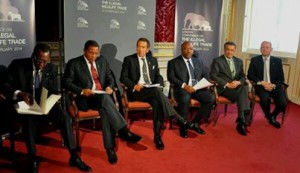
On 13 February the UK hosted governments from across all five Continents to galvanise international action on the illegal wildlife trade – The London Conference on Illegal Wildlife Trade. Our focus was to improve law enforcement to catch and punish those responsible; support the development of sustainable livelihoods in areas affected by wildlife crime; and reduce demand for wildlife products, because demand for these products is what drives the trade. Foreign Minister Tedros represented Ethiopia, a sign of the country’s commitment to deal with these issues.
Ethiopia has been a signatory of the Convention on International Trade in Endangered Species (CITES) since 1993 to protect encroachment on its resources, including wildlife. The Convention attempts to restrict trade in items made from endangered plants and animals, such as clothing, food, medicine, and souvenirs. Ethiopia has since agreed a Wildlife Development and Protection Strategy, which aims to place this sector firmly in the context of sustainable development. This is why local communities are identified as the primary stakeholder, since they will be the prime beneficiaries of related income generation e.g. through tourism.
Ethiopia is right to be concerned. Rhino became extinct from the country around 30 years ago. Reports indicate that elephants (of which there are fewer than a thousand remaining, probably far fewer) are facing the same fate. In 2012 alone, 30 elephants were poached in Babile Elephant Sanctuary (located in east Ethiopia) and over 204 smugglers were seized at airports with illegal wildlife items, according to media reports. As one of the busiest transit routes to the East, it is crucial that Ethiopia works as hard as possible to prevent smuggling of these products to Asian destinations, where demand continues to grow.
Poaching and the illegal wildlife trade are global concerns. We must not leave Africa to face this problem unsupported. The repercussions of wildlife crime, ranging from money laundering to destruction of livelihoods to supporting terrorism, affect us all. That is why the UK is committed to playing our role in helping to stop this trade and solve these issues. We have recently adopted a cross-government action plan to tackle the illegal wildlife trade. We have also announced new funding of £10 million for projects aimed at tackling poaching and the illegal wildlife trade and will release details soon on how we will spend these funds.
Last week ended with world leaders from over forty nations vowing to help save iconic species from the brink of extinction. Key states, including Botswana, Chad, China, Gabon, Ethiopia, Indonesia, Tanzania and Vietnam, alongside Russia and the United States, all signed up to actions that will help eradicate the demand for wildlife products; strengthen law enforcement; and support the development of sustainable livelihoods for communities affected by wildlife crime.
